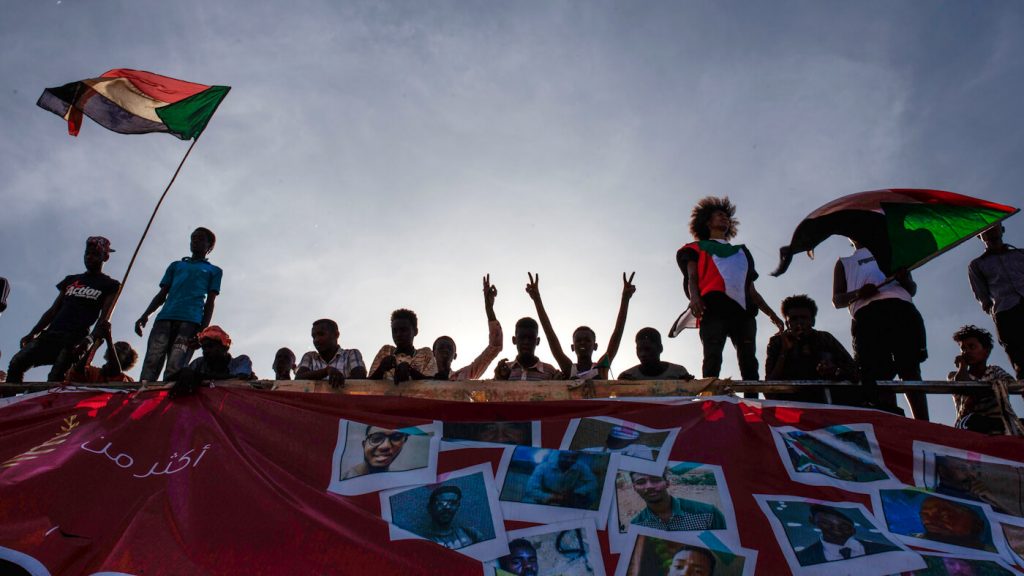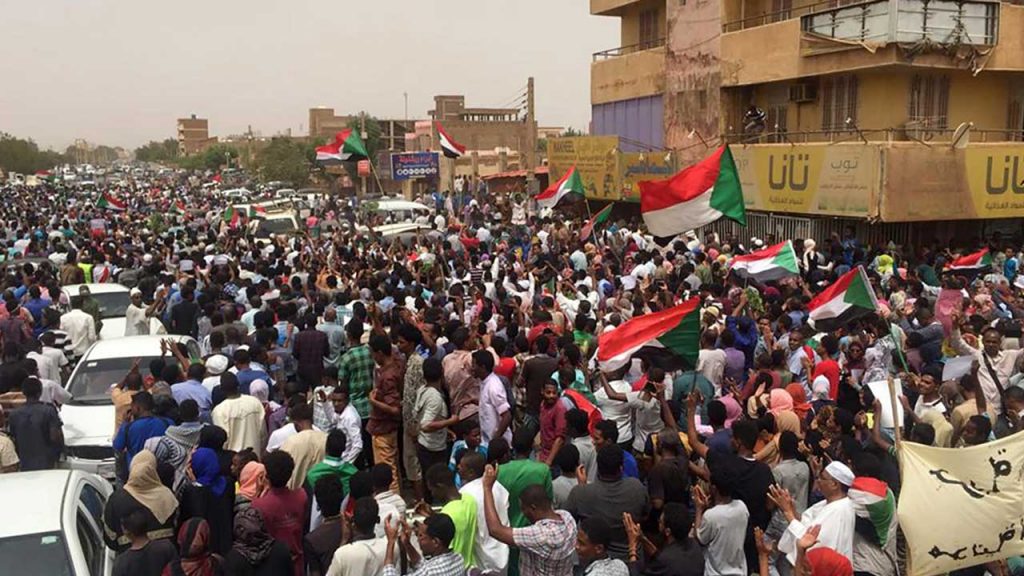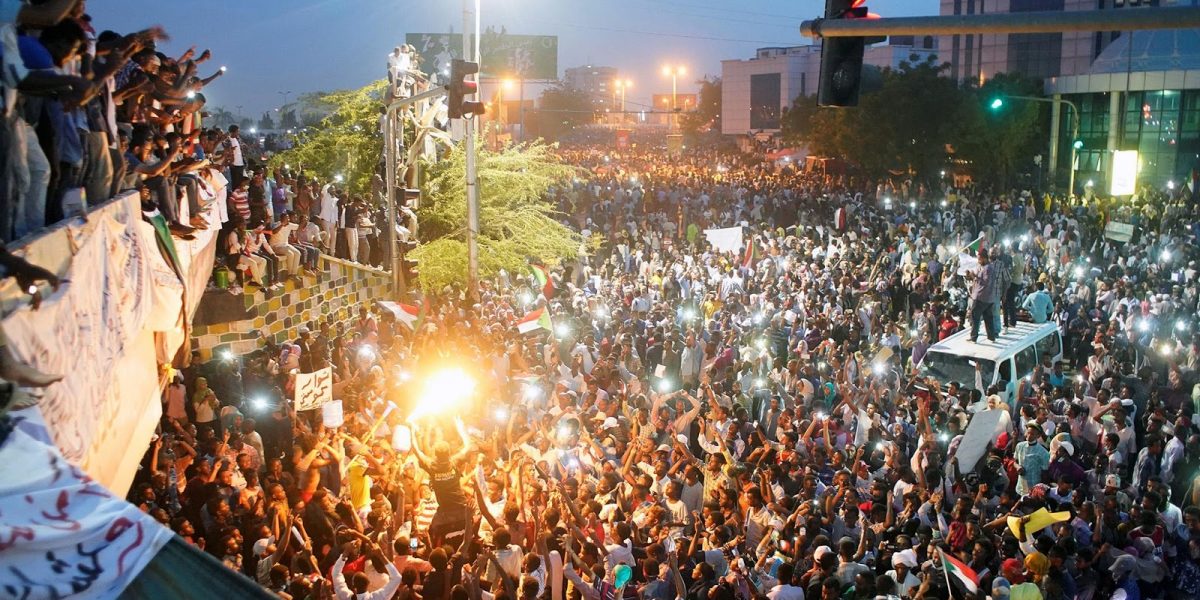For the past six months Sudanese have taken to the streets to overthrow the regime that has ruled them with an iron fist for three decades. The trigger of this revolution is not just a series of economic events; fuel scarcity, inflation and the inability of people to withdraw money from banks. Over the last 30 years, the government drove Sudan to the ground, killed thousands upon thousands of innocent men, women, and children, and split the country in half, causing a divide between the North and the South.
Below is
a timeline of the events that have taken place since December 2018:
December 2018
- Protests begin taking place in the city of Atbara, located in the River Nile State, in the north eastern region of Sudan. Increased fuel scarcity and inflation, prices in bread and the inability to withdraw money from the bank triggered these revolts; however, these are not the main reasons as to why Sudan has been facing the heaviest economic crisis since 1989.
- Omar al Bashir fires minister of communication after refusing to block social media to suppress the revolution.
January 2019
- Brutal crackdowns with lethal force used on civilians in the form of tear gas, beatings, arrests, whippings and shootings in public spaces, hospitals and at the sit-in.
February 2019
- Bashir announces a state of emergency for a year, entailing full access to citizens’ property to seize or search, arbitrary arrest, restricting the movement of citizens by implementing curfews and limiting the mobilization of organizations on the ground. This move was created solely for the purpose of concentrating power and decision-making in the hands of Bashir and only Bashir.
- Bashir says he will remain as head of state and will postpone parliament amending the constitution to run in the 2020 elections, after giving false hope that he would step down.
March 2019
- Bashir issues a series of decrees banning unlicensed demonstrations, strikes, restricting the selling of goods and services and imposing currency controls.
- Bashir transfers leadership of the ruling party to his new deputy Ahmed Harun, who is wanted by the ICC for war crimes in Darfur.
April 2019
- Sudanese civilians begin mobilizing for the largest anti-regime protest in honour of the 1985 uprisings against president Numeiri, to overthrow Bashir from his ruling seat.
- Provincial Minister confirms that Bashir has stepped down and “consultations” are underway to set up a transitional council.
- Bashir is officially ousted as the president of Sudan, and military seizes power, led by Awad Ibn Auf, Bashir’s brother in law and cousin, who was sanctioned by the US in 2007 for his war crimes against Darfur. Ibn Auf announces that he will lead a two-year transitional government. A state of emergency is declared for three months, as well as a curfew. Khartoum airport shuts down, the military takes over television and radio stations, the sit-in continues, and protestors take to the streets once more.
- After less than 48 hours ruling, Awad Ibn Auf resigns and appoints Lieutenant General Abdel-Fatah al-Burhan Abdel-Rahman as his replacement, who was formerly Bashir’s Chief of Staff of the Ground Forces.
June 2019
- June 3: RSF (Rapid Support forces – also known as the Transitional Military Council – also known as the Janjaweed) surround the sit-in grounds in front of the Military Head Quarters. Civilians are attacked, tear-gassed, beaten, injured and killed. Tents are burned down. The sit-ins are dispersed after 6 months.
- RSF/Janjaweed officers occupy main streets to terrorize civilians. Civilians are killed and raped, and their bodies are thrown in the Nile. The Janjaweed continue to terrorize Sudanese civilians while storming homes, hospitals, worship spaces, and public areas to continue their massacre. Over 150 are confirmed dead.
- African Union suspends Sudan’s membership. The AU is headed by Egypt’s President Abdel-Fattah el-Sisi, who has been in support of Sudan’s dictatorial rule.
- UN announces plans to officially abandon Sudan, a repeat of the same actions that the UN had taken during the Rwandan Genocide in 1994.
- Ethiopian Prime Minister Abiy Ahmed arrives in Sudan for mediation talks, in which the leader of the RSF, General Mohamed Hamdan Dagalo (aka Hemedti) is noticeably absent. TMC rejects all pre-negotiation demands made by the Forces of Freedom and Change.
- Janjaweed militia storm in and completely destroy the University of Khartoum.
- Janjaweed militia launch an attack on the town of Dilinj in Central Darfur.
- TMC shut down the last remaining internet source in Sudan, violating fundamental human rights, access to information and freedom of speech. Sudan is thrown into complete blackout to render victims voiceless.
- June 30: Sudanese civilians in Sudan and across the diaspora organize to mobilize for the “Millions March,” the largest mass protest since April. Five people are confirmed killed. Since the sit-ins began in December of 2018, over 150 people have been killed, over 700 injured, over 300 declared as missing, and hundreds have been detained unjustly. Meanwhile, world leaders have reverted to express their solidarity with the TMC/RSF/Janjaweed due to their own selfish political agendas, involving the ownership of oil pipelines, gold, diamonds and ridiculous sums of money, at the expense of the Sudanese civilians. As a result, Sudanese civilians have been forced to stand alone in the face of unjust atrocities and mass bloodshed, while the rest of the world has chosen to remain silent and choose the side of the oppressor. Throughout Bashir’s thirty-year rule and the entirety of the revolution from December of 2018, global leaders have decided that money, gold, oil, diamonds, and land held more significance than any human life could possibly hold. They have decided that the blood of those crying from the ground will never be louder than the machine guns who had caused the bloodshed, paid for by those who continue to believe that oil is thicker than blood.

The following is a breakdown of the roles each of these world powers play in Sudan’s ongoing conflict:
Saudi Arabia and the UAE: both of these regions have been monetarily and logistically supporting the Janjaweed since 2014, a group who have been massacring in Darfur throughout and during the Darfur Genocide (as well as in recent days) and in Khartoum since the uprisings began. Saudi Arabia and the UAE also have large agricultural investments that have resulted in land grabs and displacement. Saudi Arabia has continuously expressed their support of the Janjaweed by giving them billions of dollars of cash, weapons, and artillery, as the Janjaweed fought alongside Saudi Arabia in Yemen.
China and Russia: part of the United Nations security council, these countries have historically backed Bashir’s regime by supplying arms and investing in Sudanese oil, mining, and infrastructure sectors. Since China and Russia have agreements with Bashir’s regime (including the Janjaweed), these world powers have continuously used their veto power on the UNSC to block resolutions condemning the violence of the Janjaweed on Sudanese civilians.
USA: The
United States has a long-standing relationship with the head of Sudan’s
National Intelligence and Security Services (NISS) on
“counter-terrorism,” Salah Gosh. Gosh has been responsible for
ordering the killing of Sudanese civilians since December when the protests had
begun.
The European Union: facing massive migration issues, the EU has
been supporting Bashir’s government both logistically and monetary, providing
huge amounts of money to the Janjaweed forces through the “Khartoum
Process,” a platform for political cooperation amidst the countries along
the migration route between the Horn of Africa and Europe.
Qatar, Turkey, and Iran: these three countries have ideologically supported Sudan’s Muslim Brotherhood through the provision of training, political support, and investments.
Canada: in recent days, a Montreal based lobbying firm, Dickens & Madson, has signed a US $6 million dollar deal with the Janjaweed with the promise of expressing the “legitimacy” of the TMC by lobbying the AU, the UN, and the US, provide equipment to the military council when needed, invest in their oil and continue to strengthen ties with Russia and Saudi Arabia. This contract was signed by Ben Menashe (a former Israeli intelligence officer, who had worked with Zimbabwean dictator Robert Mugabe), Libyan militia commander Khalifa Haftar, and Arthur Porter (the head of Canada’s spy watchdog, the Security Intelligence Review Committee, who was arrested in Panama in 2013 on fraud charges in connection with SNC-Lavalin).

Painting the world blue
Sudan is in the midst of a complete internet blackout to prevent the masses from mobilizing. However, while world leaders have continued with their silence, the Sudanese diaspora around the world has become the voice of Sudan. Slowly, without any internet, Sudan painted the whole internet – and the whole world – blue, symbolizing those who were killed while peacefully fighting for the revolution. As I scroll through my timeline on Twitter, Facebook and Instagram, the whole world is revolutionizing, while many in Sudan have no idea that they broke the internet without any access to the internet.
June 30, 2019, marks 30 years of oppression and struggle for the Sudanese people since Bashir was the ruling power. Thousands upon thousands of diaspora took to the streets across North America, Europe, Africa, Asia, and Australia, peacefully demanding upon world governments to support the Sudanese civilians on the ground and help bring peace to Sudan. Meanwhile, in Sudan, the largest protest since April mobilized, as millions took to the streets demanding freedom, peace, and justice through a civilian rule. This was all done through word of mouth. In an attempt to prevent people from mobilizing, Sudan was thrown into a complete blackout. However, the resilience of the people has made this one of the most successful protests by far, as people went door-to-door handing out fliers to spread the word of the June 30th Millions March. Nonetheless, regardless of their peaceful protesting, the Janjaweed also took to the streets with military tankers, tear gas and ammunition in an attempt to disperse protestors. According to the Central Committee of Sudanese Doctors (CCSD), five deaths have been confirmed throughout the recent protests, as well as serious injuries inflicted on masses peacefully protesting across Sudan.
Despite the bloodshed, despite the pain, the suffering, and the loss, the Sudanese remain strengthened in their numbers. Not once has any Sudanese civilian picked up a weapon or fought back with their fists. Instead, they have used poetry, song, dance, music, and art to bring the revolution alive and keep it thriving. Even when the sit-in was burned down, destroyed and the artwork painted over as if nothing had ever been there, the images of the sit-in remains burning, as clear as day, in the minds of all Sudanese people, both on the ground and within the diaspora. No other nation has been able to overthrow two leaders in less than three days or bring the entire country together without any source of online connection or outside aid. No other nation has remained peaceful in the face of adversity or used poetry to fight against the violence. No other nation has proven, without a doubt, that no boundary, not even complete blackout, can ever get in their way of revolutionizing to create a new Sudan.
This is shared from peoplepoliticsandpersecution
Did you like this article? Help us produce more like it by donating $1, $2, or $5. Donate

